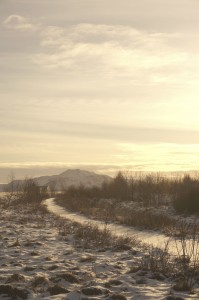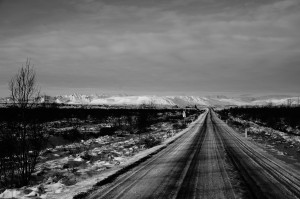Check watch: 4:05.
Lie down under a short but sturdy blue spruce. Feel the snow falling on my face, leaving it close to numb, but with enough feeling to recognize when each new flake lands on my cheek. Find myself wishing it would just go all the way numb. Quickly realize my glasses are getting wet from the outside and fogging up on the inside all at once. Take a break from all the cold discomfort to play with a twig, drawing shapes in the snow, which of course I cannot see due to my wet, fogged up glasses. Give up on my stick drawings and try to meditate. Breathe in, out…in, out… think of nothing, yet simultaneously make sure to appreciate the nature around me. Find myself thinking too much about appreciating nature, and give up on meditating. Think about how much time has passed. Surely it’s been close to an hour. Surely it’s almost time to head back to Brekkukot. What a nice (albeit cold) time I’ve had out here at my “sit-spot” – out here in the wilderness.
Check watch: 4:21. Take a deep breath – still got another 44 minutes to go.
I’ve spent plenty of time alone in nature before. When I was 16, I spent three days and two nights alone in the woods, with just a tarp, a journal, and a bag of GORP. I’ve chosen, in the past, regular “sit spots” for myself, where I could be alone in nature and reflect on the beauty and the processes going on around me. But that doesn’t mean it ever gets any easier. And don’t get me wrong – I’m not saying it’s difficult to sit back and appreciate the beauty of the deep, dark woods, or to gaze in awe at a sunset from the top of a mountain. Of course, these are things most people would find enjoyable. What I’m talking about is the longer-term – in an abstract sense, even lifelong – immersion in and appreciation of the natural world. More importantly, understanding how to think of nature – how to place ourselves within it.

I’m talking about things like contemplating how we can treat the natural world with the respect it needs while simultaneously filling our own needs and feeding our own spirits. Let me give an example. When I was sitting out in the woods today, I had a hard time sitting still in beginning – both physically and mentally. I quickly found myself wanting to play and interact with the natural setting around me… to give myself something to focus on, something to stimulate my mind and body. I began drawing in the snow with a nearby twig, making snowballs, and trying to find other things to occupy my hands. Then I stopped and thought: why do I feel the need to “use” features of the natural world for my own entertainment? Is it not enough to sit and take in the beauty of the processes occurring around me? Was I, the human, “domesticating” the stick, the snow? Simply using them for my own benefit? Maybe, as a result of having grown up in an activity-oriented, progress-oriented culture that emphasizes busyness and stress as signs of productivity, I am incapable of just being. But, when it comes down to it, I don’t like to think I’m incapable – I like to believe just haven’t been given enough adequate chances to try. After all, this is the culture I’ve grown up in. This is “what I know.” So I decided then that this was my chance to try, and that I’d spend the remainder of my time trying to just appreciate, without feeling the need to actively participate in, nature.
But after a few moments, I began to wonder if mere objective “appreciation” of nature might not be possible. It’s like anything else in life – we tend to learn a great deal more by engaging with our subject matter than we do when we simply observe it. My mind turned to Richard Louv’s Last Child in the Woods, in which he discusses the differences between children and adults who describe themselves as feeling truly connected with nature and those who do not feel this sense of connection. Those who looked at nature or “wilderness” as a distant, faraway place to be “viewed” or to go visit for just a short while (in other words, those who view nature as separate from everyday life) tended to value their connection with nature less than those who often actively engaged in the natural world or simply played outside. Louv points out that it has much to do with engaging with the outside world – thinking “outside the box” when it comes to playing outdoors, inventing one’s own games, and finding meaningful and personal ways to connect with nature, which often entails using natural objects for one’s entertainment or learning purposes – for instance, climbing a tree or catching frogs in a pond. After contemplating this dilemma for a while, I think I agree with Louv. Nature is perfectly nice when viewed from a distance, untouched, but I think we can actually gain an even deeper respect for the natural world if we really engage with it, as long as we do so in a way that is respectful.
The fact that it is difficult – uncomfortable, even – to sit in one spot in the middle of the woods for one hour proves the importance of our engagement with nature. Especially in today’s technology-obsessed world, so focused on instant gratification, it is more important than ever to challenge ourselves to understand our own relationship with the natural environment, even – no, especially – if it makes us uncomfortable. Time seemed to be moving so slowly during that hour I spent outside – only 16 minutes had passed when I began to feel cold, tired, and ready to leave the woods – but the fact that even I, someone who generally appreciates and engages with nature, became impatient after just 16 minutes? Well, that says something about the importance of experiences like this.
As I was leaving my site, I noticed that there were several houses nearby hidden by some trees. At first I was disappointed. I felt like my entire experience had been a failure. I’d made it through the whole hour only to realize I wasn’t really in the wilderness, after all – I was essentially in someone’s backyard. But then it hit me – the fact that humans exist in nature does not make nature any less valuable or meaningful. In fact, we need to recognize humans’ presence and role in the natural world in order to fully appreciate it. To simply set aside the natural world, labeling it as “wilderness,” this place that is somehow separate from us, means to live in a false reality. We are a part of nature – we just need to critically reflect on how we engage and interact with it.

-Adriana Walsh
